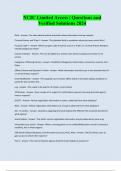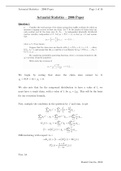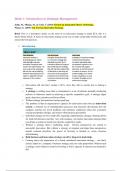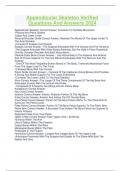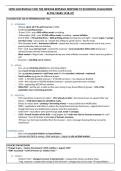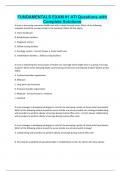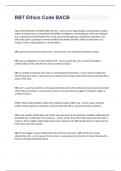Integrative exam
Memory, language, and emotion
Aantekeningen TT 1
B&C Memory, Language and Emotions
Lecture 1
Introduction course
Literature, parts of:
- The two books
- Plus additional papers for Lecture 3
Memory
Retention is not passive storage (like a book in
a library), there is a lot going on
Different types of memory
OVERNEMEN!!
Practical importance?
• Does it help you get a better grade in this course? → YES!
Efficient study: How to achieve?
• Divide your time over the next few weeks
o See the “spacing effect"
• Make sure you can reproduce the information
o See the "generation effect", “retrieval practice effect" (try to start testing yourself ASAP)
o And “levels of processing effect"
• No alcohol during learning
o See “state-dependent learning”
,In this lecture
• A brief history of memory research
o Ebbinghaus
o And several others
o Memory psychology and cognitive psychology
• Neurobiology of memory (separate presentation: 1.b)
Ancient times
Aristotle (384-322 BC)
• Associations between stimuli
Two things that happen in close succession, the brain very easily ties
those together.
Important philosophical thought in 17th and 18th Century (mainly
British: John Locke, John Stuart Mill)
Rhetorica ad Herennium (80 BC)
Method of loci →
Charles Darwin (1809-1882)
The evolutionary importance of responding to the
environment
→ Good example of this evolution is the honeybee!
You have a memory that
lasts from minutes to
hours to days!
Just to be sure: You don't have to learn this diagram, nor the next!
Illustration: The memory stages of a honey bee
→Bees have memory stages that support their efforts in foraging for honey
Hermann Ebbinghaus (1850 - 1909)
Founder of modern memory psychology
Main work "Über das Gedächtnis“ from 1885
n = 1 study (i.e., 1 person = Ebbinghaus)
(One experiment he did for about one year, 1228 different lists each consisting of 13
meaningless syllables)
,Ebbinghaus’ forgetting curve →
More about forgetting in Lecture 5
Adolf Jost (1897)
• Jost’s Law: If two memory traces have equal
retrieval probability, but different ages, the older
one will
o (a) be forgotten more slowly than the
younger one
o (b) benefit more from additional learning
Reviewed by Wixted (2004) and found to be an accurate,
general description of the data
Sir Francis Bartlett (1886-1969)
Focus on existing knowledge
→ Memory as a construction (Schemata, Gestalt psychology)
Memories are complemented by
known information
Memory completes information that is
left out (missing part of the plate)
You need to remember less detail, but
also leads to mistakes like this
William James (1842-1910)
- One of the founders of psychology
- Distinguish primary and secondary memory (short term and long-term memory)
- Tip-of-the-tongue phenomenon
Sigmund Freud (1856-1939)
- Emphasis on unconscious processes
- Repression as a mechanism for forgetting (influence of emotion, trauma?)
- Slip-of-the-tongue phenomenon
Neurobiology:
Lasley (1925) In search of the engram
→ not just one place for memory, it was all over the place. Not a problem of where you removed, but how
much you removed.
, Neurobiology
Theodule Ribot (1839-1916)
- Neuropsychology of memory
- Ribot gradient (if you have memory loss due to disease
or an accident, the older memories go first)
- He’ll be back in Lecture 8
Donald O. Hebb (1904-1985)
- Hebbian learning (neural networks)
- “Cells that fire together wire together”
- (He never actually said that, but still...)
- He’ll be back after the break
Behaviorists
More on implicit memory in Lecture 4
Pavlov (1849-1936)
→ American Behaviorist don’t care about what is inside the
skull, just looking at behavior.
- Watson (1878-1958)
- Skinner (1904-1990)
fear conditioning
→ You can condition fear onto anyone,
even humans!
operant conditioning
(reward/punishment)
Cognitive psychology (From 1950)
• Influenced by
o Emerging computer science in the 1940s
o Shannon and Weaver’s “A Mathematical Theory of Communication” (Shannon popularized
the concept of ‘bit’)
o Computer memory:
▪ RAM vs. Hard-disk = STM vs. LTM
• Memory now viewed as carrier of information that is manipulated during cognition
Cognitive psychology (From 1950)
Miller's law (1956)
→ The magical number 7 ± 2. (how much you can process, 7 things plus or minus 2)
Broadbent's (1958) Information model
OVERNEMEN →
Too much information too process, thus there are
filters in the brain
Memory, language, and emotion
Aantekeningen TT 1
B&C Memory, Language and Emotions
Lecture 1
Introduction course
Literature, parts of:
- The two books
- Plus additional papers for Lecture 3
Memory
Retention is not passive storage (like a book in
a library), there is a lot going on
Different types of memory
OVERNEMEN!!
Practical importance?
• Does it help you get a better grade in this course? → YES!
Efficient study: How to achieve?
• Divide your time over the next few weeks
o See the “spacing effect"
• Make sure you can reproduce the information
o See the "generation effect", “retrieval practice effect" (try to start testing yourself ASAP)
o And “levels of processing effect"
• No alcohol during learning
o See “state-dependent learning”
,In this lecture
• A brief history of memory research
o Ebbinghaus
o And several others
o Memory psychology and cognitive psychology
• Neurobiology of memory (separate presentation: 1.b)
Ancient times
Aristotle (384-322 BC)
• Associations between stimuli
Two things that happen in close succession, the brain very easily ties
those together.
Important philosophical thought in 17th and 18th Century (mainly
British: John Locke, John Stuart Mill)
Rhetorica ad Herennium (80 BC)
Method of loci →
Charles Darwin (1809-1882)
The evolutionary importance of responding to the
environment
→ Good example of this evolution is the honeybee!
You have a memory that
lasts from minutes to
hours to days!
Just to be sure: You don't have to learn this diagram, nor the next!
Illustration: The memory stages of a honey bee
→Bees have memory stages that support their efforts in foraging for honey
Hermann Ebbinghaus (1850 - 1909)
Founder of modern memory psychology
Main work "Über das Gedächtnis“ from 1885
n = 1 study (i.e., 1 person = Ebbinghaus)
(One experiment he did for about one year, 1228 different lists each consisting of 13
meaningless syllables)
,Ebbinghaus’ forgetting curve →
More about forgetting in Lecture 5
Adolf Jost (1897)
• Jost’s Law: If two memory traces have equal
retrieval probability, but different ages, the older
one will
o (a) be forgotten more slowly than the
younger one
o (b) benefit more from additional learning
Reviewed by Wixted (2004) and found to be an accurate,
general description of the data
Sir Francis Bartlett (1886-1969)
Focus on existing knowledge
→ Memory as a construction (Schemata, Gestalt psychology)
Memories are complemented by
known information
Memory completes information that is
left out (missing part of the plate)
You need to remember less detail, but
also leads to mistakes like this
William James (1842-1910)
- One of the founders of psychology
- Distinguish primary and secondary memory (short term and long-term memory)
- Tip-of-the-tongue phenomenon
Sigmund Freud (1856-1939)
- Emphasis on unconscious processes
- Repression as a mechanism for forgetting (influence of emotion, trauma?)
- Slip-of-the-tongue phenomenon
Neurobiology:
Lasley (1925) In search of the engram
→ not just one place for memory, it was all over the place. Not a problem of where you removed, but how
much you removed.
, Neurobiology
Theodule Ribot (1839-1916)
- Neuropsychology of memory
- Ribot gradient (if you have memory loss due to disease
or an accident, the older memories go first)
- He’ll be back in Lecture 8
Donald O. Hebb (1904-1985)
- Hebbian learning (neural networks)
- “Cells that fire together wire together”
- (He never actually said that, but still...)
- He’ll be back after the break
Behaviorists
More on implicit memory in Lecture 4
Pavlov (1849-1936)
→ American Behaviorist don’t care about what is inside the
skull, just looking at behavior.
- Watson (1878-1958)
- Skinner (1904-1990)
fear conditioning
→ You can condition fear onto anyone,
even humans!
operant conditioning
(reward/punishment)
Cognitive psychology (From 1950)
• Influenced by
o Emerging computer science in the 1940s
o Shannon and Weaver’s “A Mathematical Theory of Communication” (Shannon popularized
the concept of ‘bit’)
o Computer memory:
▪ RAM vs. Hard-disk = STM vs. LTM
• Memory now viewed as carrier of information that is manipulated during cognition
Cognitive psychology (From 1950)
Miller's law (1956)
→ The magical number 7 ± 2. (how much you can process, 7 things plus or minus 2)
Broadbent's (1958) Information model
OVERNEMEN →
Too much information too process, thus there are
filters in the brain

